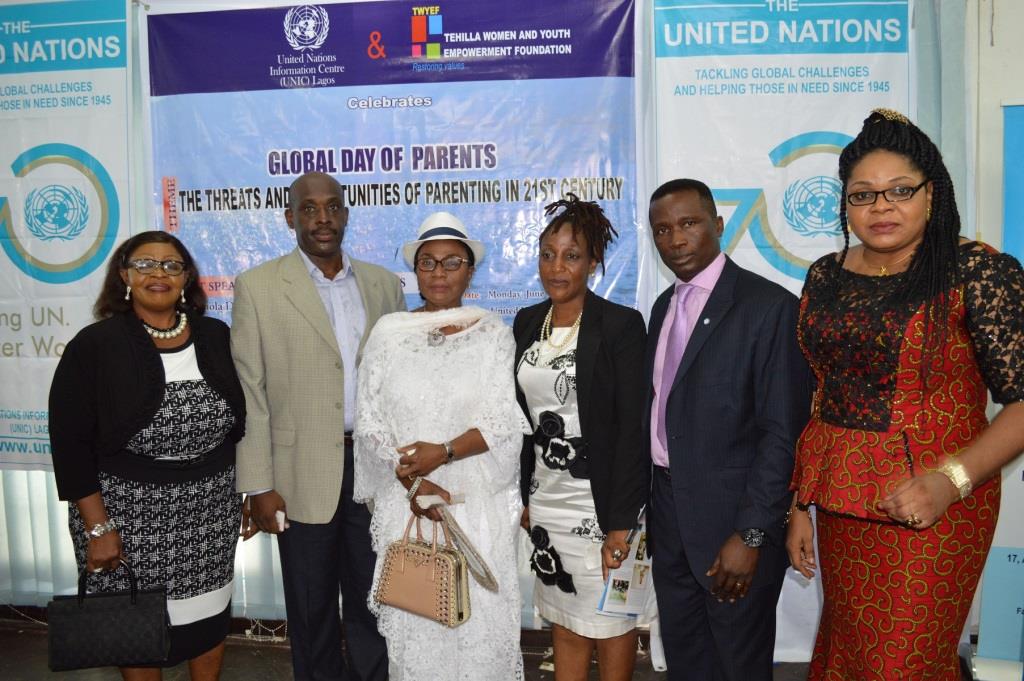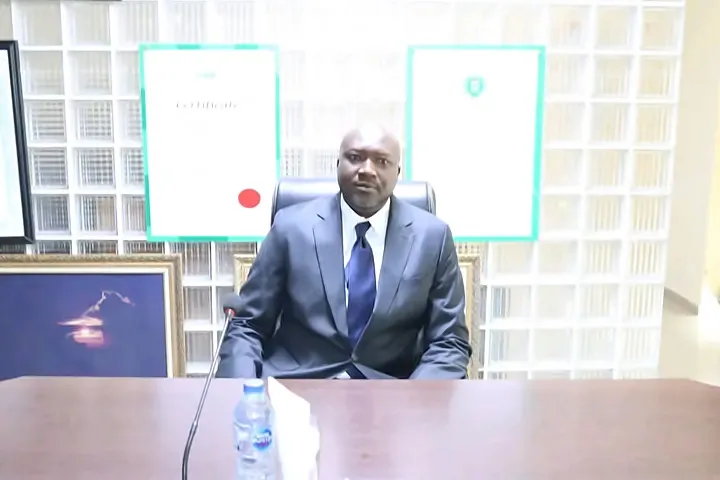General
UNIC Lagos Unveils World’s First Complete Braille of UDHR

By Modupe Gbadeyanka
The United Nations Information Centre (UNIC) Lagos Nigeria, on Monday, December 11, 2017 launched the first complete braille version of the Universal Declaration of Human Rights (UDHR) to mark the 2017 International Human Rights Day and the beginning of the year-long campaign to commemorate the 70th anniversary of the adoption of the UDHR.
Launching the braille at the National Human Rights Commission headquarters in Abuja was the Resident Coordinator of the UN system in Nigeria, Mr Edward Kallon, with the support of the Solicitor-General of the Federation, Mr Dayo Akpata (Esq); the Canadian High Commissioner to Nigeria, Mr Christopher Thornley; and the Acting Executive Secretary of the National Human Rights Commission, Mrs Oti Ovrawah.
To the admiration of the audience, two students of Abuja School of the Blind, Miss Jacinta Odili and Mr Honesty Ayama read UDHR Articles One and Seven respectively from the braille.
Explaining the rationale behind the UNIC Lagos initiative to produce the Braille Version, Mr Kallon said, “In strengthening the efforts to leave no one behind and deepen universal access and usage of the UDHR, the United Nations Information Centre (UNIC) Lagos, Nigeria, initiated and produced the Braille Version of the UDHR for the blind. We have heard of UDHR in sign language as well as in audio format. But, this Braille Version probably is the first of its kind in the world.”
According to him, this effort aligns with the directive of the UN Secretary-General Antonio Guterres that making global development inclusive of people with disabilities “must be an enhanced priority”. Delivering the message of the UN Secretary-General on the International Human Rights Day, the Resident Coordinator urged people and leaders everywhere to stand up for all human rights – civil, political, economic, social and cultural — and for the values that underpin our hopes for a fairer, safer and better world for all.
In her remarks, Mrs Ovrawah called on human rights defenders, activists, CSOs and NGOs to stand up for the rights of all, the IDPs, the refugees, the trafficked and those still in the captivity of Boko Haram and those in ‘slavery’ and held in bondage in Libya.
At the observance of the International Human Rights Day on the same day in Lagos, the Director of UNIC Lagos, Mr Ronald Kayanja made a public presentation of the Braille Version of the UDHR at the event jointly organised with the Zonal Office of the National Human Rights Commission, and held at Ikeja Local Government Council Secretariat.
“The Braille Version of the UDHR”, he explained, “therefore, aims to foster unity within diversity and enhance a sense of inclusiveness amongst the visually challenged, whose rights as human beings are enshrined in and protected by the UDHR.”
He disclosed that in Nigeria, the UDHR has been translated into Edo, Efik, Ibibio, Hausa, Igbo, Kanuri Yerwa, Tiv, Yoruba and Pidgin English. “This gives credence to the need to leave no one behind,” he emphasised.
Mr Kayanja later led participants, who were mainly secondary students, to read and affirm the Human Rights Pledge to defend the rights of others as part of commemorating the 70 years of the Universal Declaration of Human Rights (UDHR). ‘When another’s human rights are denied, everyone’s rights are undermined. So I will stand up,’ they affirmed.
The UDHR is a milestone document in the global history of human rights, and is infused with values and ideals drawn from the world over. Drafted by UN representatives from diverse cultural and technical backgrounds, the Declaration was proclaimed by the United Nations General Assembly in Paris on 10 December 1948 as a common standard of achievements for all peoples and all nations.
In 70 years of its existence, the UDHR has proven to be resilient and critical to the well-being of the human race. Its appeal is unprecedented, and it cuts across regions and races. In 1999, the Guinness Book of World Records declared the UDHR to be the most translated document in the world. Today, with 505 translations, it still is.
General
NIMASA Rallies Stakeholders’ to Develop National Action Plan

By Adedapo Adesanya
The Nigerian Maritime Administration and Safety Agency (NIMASA) has pledged its commitment to provide the regulatory leadership, technical coordination, and stakeholder engagement required to successfully develop and implement a robust National Action Plan on maritime decarbonization in Nigeria.
The Director General of the agency, Mr Dayo Mobereola, made this known during the National Stakeholders’ workshop on the development of a National Maritime Decarbonization Action Plan, further describing the workshop as a critical step in actualising the Federal Government’s blue economy and climate objectives.
Represented by the Executive Director, Operations, Mr Fatai Taiye Adeyemi, the NIMASA DG underscored the significance of the IMO GreenVoyage2050 Project, a technical cooperation initiative /designed to support developing countries in implementing the IMO GHG Strategy.
According to him, the National Action Plan being developed will reflect national realities, leverage existing capacities, address identified gaps, and align with broader economic and environmental priorities of the federal government.
Mr Mobereola stressed that “this transition is not merely about compliance with international obligations, it is about safeguarding our marine environment, protecting public health, strengthening the blue economy, and ensuring that our maritime industry remains competitive and future-ready”, the DG said.
Also speaking at the event was the Technical Manager of the IMO GreenVoyage2050 Project, Ms Astrid Dispert, who highlighted that the overarching objective of the initiative is to advance a coherent and globally aligned regulatory framework to accelerate maritime decarbonization.
She also emphasised that NIMASA plays a pivotal role in driving the project at the national level.
The IMO GreenVoyage2050 Project provides technical expertise and institutional support to assist countries in developing and implementing National Action Plans that promote sustainable shipping practices, encourage investment in clean technologies, and strengthen capacity for long-term emissions reduction.
Through this collaboration, the federal government is advancing deliberate steps towards maritime decarbonization, reinforcing its commitment to global climate goals and ensuring a cleaner, greener, and more sustainable future for the sector.
General
BPP Mandates Digital Submission for MDAs From March 1

By Adedapo Adesanya
The Bureau of Public Procurement (BPP) has directed all Ministries, Departments and Agencies (MDAs) to comply with its digital submission process effective March 1.
The directive was contained in a circular signed by the Director-General of the Bureau, Mr Adebowale Adedokun, noting that the move was part of the bureau’s commitment to digital transformation and paperless governance.
It explained that the transition followed an earlier circular of Aug. 4, 2025, which introduced electronic submission procedures.
According to the bureau, it has successfully moved from physical filings to a dedicated e-mail service for document submissions and is now advancing to a more robust and integrated system.
The circular announced the inauguration of the BPP Digital Submission Portal, a web-based platform designed to enable MDAs submit procurement-related documents directly to the Bureau.
It stated that the automated platform would streamline the submission process, enhance transparency and ensure accelerated tracking of procurement-related documents and petitions.
“With effect from March 1, all MDAs will be required to use the portal to submit requests for ‘No Objection’ Certificates, approvals for ‘No Objection’ for special procurements, clarifications and status updates on submissions,” the bureau said.
It added that the portal would be hosted on the Bureau’s official website and would become fully operational from the effective date.
The bureau warned that physical submissions or manual hand-deliveries would no longer be prioritised and would eventually be rejected following the full transition to the digital platform.
It urged accounting officers to brief their procurement departments and ICT units on the development to ensure seamless processing of procurement activities from March 1.
It further advised MDAs to contact the Bureau via its official email for information on the onboarding process and integration into the portal.
The bureau emphasised that full compliance by all MDAs was required to ensure a smooth transition and avoid delays in the implementation of the 2026 fiscal year procurement processes.
General
Senate Seeks Removal of CAC Boss Hussaini Magaji

By Adedapo Adesanya
The Senate has asked President Bola Tinubu to remove the Registrar General of the Corporate Affairs Commission (CAC), Mr Hussaini Ishaq Magaji, from office.
The Senate Committee on Finance, while passing a resolution in Abuja on Thursday, accused Mr Magaji, a Senior Advocate of Nigeria (SAN), of failing to honour the Senate’s invitations to account for the finances of his agency.
“He refused on so many occasions to honour our invitation to appear before this committee.
“We have issues with the reconciliation of the revenue of CAC.
“Each time we invite him, he gives us excuses,” the Chairman of the committee, Mr Sani Musa, said as the committee passed the resolution.
CAC was part of a group of agencies that the House of Representatives Public Accounts Committee (PAC) recommended zero allocation for the year 2026, for allegedly failing to account for public funds appropriated to them.
The committee, at an investigative hearing held two weeks ago, accused CAC and some other ministries, departments and agencies (MDAs) of shunning invitations to respond to audit queries contained in the Auditor-General for the Federation’s annual reports for 2020, 2021 and 2022.
The PAC chairman, Mr Bamidele Salam, stated that the National Assembly should not continue to appropriate public funds to institutions that disregard accountability mechanisms, saying this will create fiscal discipline and strengthen transparency across federal institutions and conform with extant financial regulations and the oversight powers of the parliament.
“Public funds are held in trust for the Nigerian people. Any agency that fails to account for previous allocations, refuses to submit audited accounts, or ignores legislative summons cannot, in good conscience, expect fresh budgetary provisions. Accountability is not optional; it is a constitutional obligation,” he said.
-

 Feature/OPED6 years ago
Feature/OPED6 years agoDavos was Different this year
-
Travel/Tourism10 years ago
Lagos Seals Western Lodge Hotel In Ikorodu
-

 Showbiz3 years ago
Showbiz3 years agoEstranged Lover Releases Videos of Empress Njamah Bathing
-

 Banking8 years ago
Banking8 years agoSort Codes of GTBank Branches in Nigeria
-

 Economy3 years ago
Economy3 years agoSubsidy Removal: CNG at N130 Per Litre Cheaper Than Petrol—IPMAN
-

 Banking3 years ago
Banking3 years agoSort Codes of UBA Branches in Nigeria
-

 Banking3 years ago
Banking3 years agoFirst Bank Announces Planned Downtime
-

 Sports3 years ago
Sports3 years agoHighest Paid Nigerian Footballer – How Much Do Nigerian Footballers Earn












